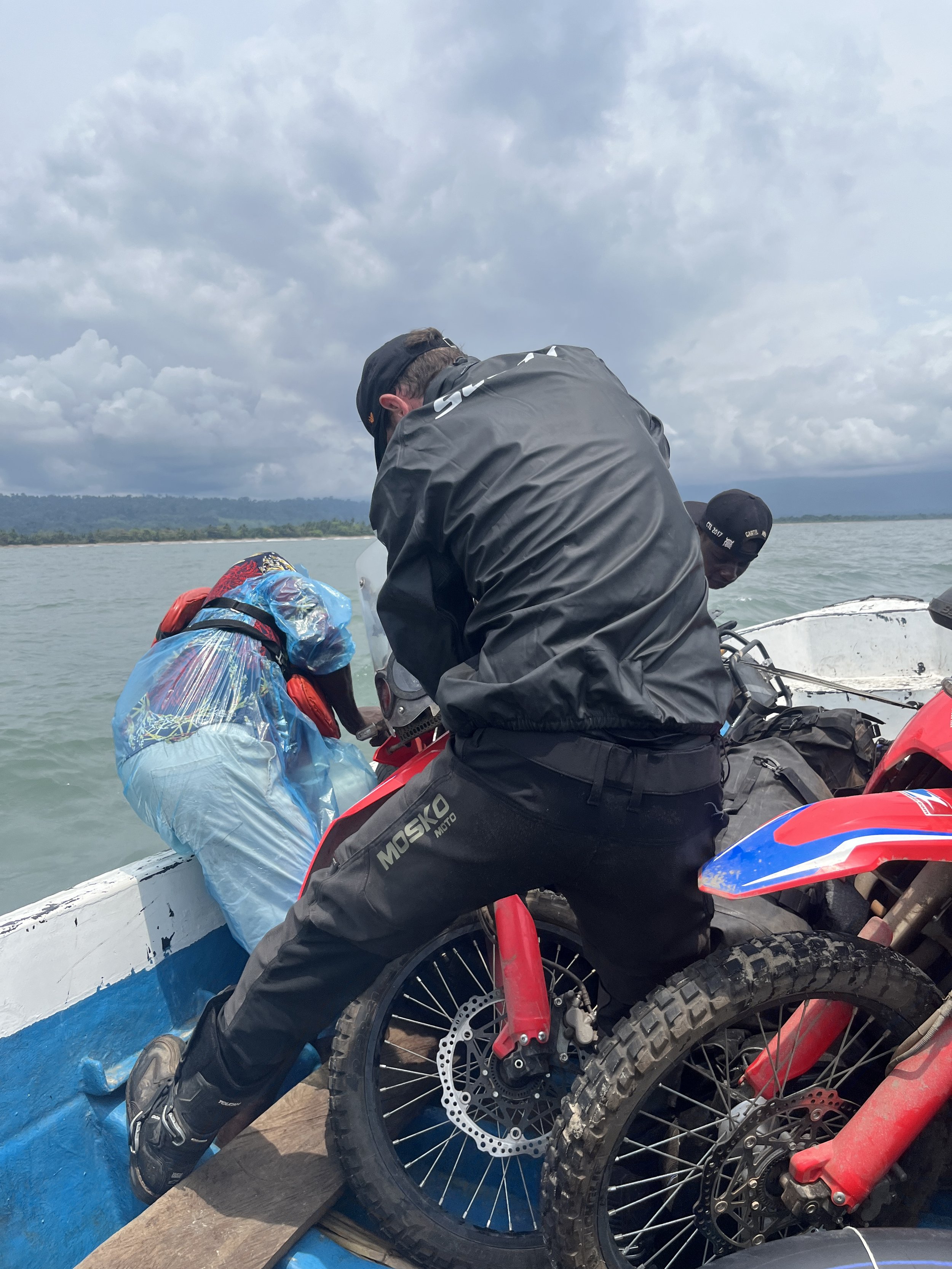When we entered Nigeria coming from Benin, we couldn’t believe it: There was a checkpoint every 100 meters. Every 100 meters. Some of them were legit, some were run by random locals. The police and army checkpoints were heavily armed but waved us through. The more informal ones were sort of armed, too: One person had a golf club, a driver to be precise. So we did what we had read about but found hard to imagine beforehand: we ignored the checkpoints. We don’t stop for people with golf clubs.
If you heavily zoom into the rear view mirror of the picture below, you see one of the checkpoints (which are hard to photograph if you’re on a motorcycle).
We took the fastway to Lagos and the closer we got, the more traffic there was. Like we’d seen in other countries on our route before, a highway can turn into a market anytime. Suddenly, there’s a traffic jam, yellow cabs everywhere, there are vendors on both side of the roads – and on the road. Vendors move through the lanes, carry goods on their heads and try to sell water, nuts, snacks, phone cases, clocks, whatever.
The whole 90 kilometers from the border to Lagos, there were lots of people by the side of the road. No surprise: Nigeria has the 6th largest population in the world. Lagos is a megacity with more than 20 million people.
We were happy to reach Lekki Phase 1 (what a name!), a district that is among the Lagos districts considered to be relatively safe.
In Lekki Phase 1 (pictured above), we saw how the security situation we had read about translates to real life: The hotel had a big gate with security guards. So did the street the hotel was in. So did the neighborhood the street was in.
In the evening, we got in a cab and met Razaq – a friend of a friend – for a few drinks. He explained the vibe of the city to us: Lagos hustles harder. “Get rich or die trying” seems to be the mantra. The city is full of opportunities and you might wake up loaded tomorrow. And if you’re loaded, you might wake up poor the next day. Those who have made money like to show it. Some people – among them internet criminals (called Yahoos here) – easily spend 20.000 US Dollar a night. There’s nothing you can’t get for money in Lagos. We heard this several times during our stay – and people seem to take some pride in it.
The next day, we went to Nike Art Gallery. The space is not connected to the sports brand but run by artist Nike Davies-Okundaye. We were lucky enough to meet her at the gallery. Turns out, she has family ties to Darmstadt, Germany.
Ever since Bola Tinubu became president last May, Nigeria’s economy has been on a deep dive, putting more pressure on an already fragile situation. While we were there, a warehouse was looted in the capital Abuja. Ambazonian separatists, seeking independence from the Republic of Cameroon, carried out an attack on the Nigerian borderline village of Belegete. 250 people were victim of a mass kidnapping in the North.
Throughout the country, kidnapping of individuals has been sharply on the rise in the last months. At the end of our visit at the gallery, one of Nike’s employees told us about her cousin being forced into a car at gunpoint in Lekki (not Phase 1) and released only for a massive ransom. She urged us to be very cautious.
From Lagos we took the highway east to Benin-City. There were two lanes in each direction, usually separated by a few meters – but both directions were used both ways. Meaning: you’re on a highway and there’s always the possibility of someone coming straight at you. This, the occasional deep pothole and the (bypassing of) approx. 40 checkpoints made for some intense riding.
From Benin-City we went to Ikot Ekpene – and we only stopped for gas. In one of the cities along the way, Thies suddenly found himself between a cash transporter and the vehicle guarding it. On top of it were guys with machine guns – and they got veeeery nervous. But after some (very long) seconds they went their way and we went ours. No harm done.
Other security men felt less threatened by us. See picture below.
We continued eastwards in the direction of Oron. From here, we planned to either take a speedboat or a ferry to Cameroon. The third option would have been to take the road to Banyo, an offroad track through the mountains that has been praised by overlanders as incredibly beautiful. But it didn’t seem like a good idea at the time.
In order to leave Nigeria, we first had to get our Carnet de Passages stamped at the customs office (see below).
The next morning, we rode from Oron to James Town, from where the speed boats leave. We decided against the ferry because it was totally unclear when it departs.
At the harbour, our bikes were lifted into the speed boat by hand. Good that we chose such light bikes.
It was time to say goodbye to Jennifer, our contact at the logistics firm organizing the speed boat trip.
And it was time to say goodbye to Nigeria.
A three hour trip on the speed boat was ahead of us. And some maritime checkpoints. Piracy is a big problem in the region – the crews of the Nigerian navy boats were heavily armed. They checked our documents and at one point we were falsely accused us of having overstayed our visa – but the accusation was dropped quickly.
We quickly got away from the coast and saw some offshore oil platforms. The overall mood was good.
The longer the trip was, the rougher it got though. Turns out speed boats are not really made to transport motorcycles. They take hard hits on the waves and our bikes were improperly secured. They were bumping around, so we stopped about 10 times to rearrange and prevent them from getting damaged – something that had happened to two Englishmen a few weeks ahead of us. At some stage it started to rain cats and dogs, but after about half an hour it cleared up again.
We reached Cameroon waters and were relieved and sad at the same time. Relieved about leaving a country that didn’t feel safe. Sad about not having been able to explore it. From all we read and saw, Nigeria is a beautiful country and we met nice people along the way. And even more sad for the ones living there. We were just passing through. But as the security situation worsens, many live in constant fear.
























